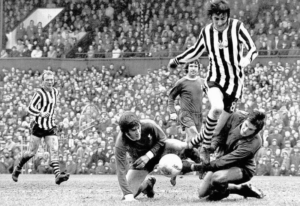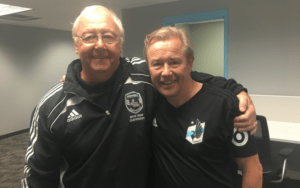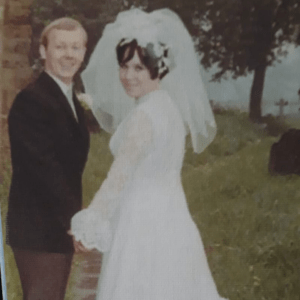John Tudor was known as a fantastic footballer and even better human. He played for several English football clubs, including Newcastle United, Sheffield United, and Stoke City. In Tudor’s later years, his family noticed agitation, forgetfulness, and signs of cognitive decline. Following Tudor’s death in February 2025 at the age of 78, his brain was donated to the UNITE Brain Bank and is currently being studied by BU researchers. Below, John’s wife, Anne, shares his Legacy Story in the hopes of sparing other families from a similar experience.
Early life and football career
All John Tudor ever truly wanted was to play professional football. From a young age, kicking a ball wasn’t just a pastime—it was everything. Through sheer hard work and determination, he turned that dream into reality.
John began his journey with local teams before playing for Ilkeston Town, his hometown club. In 1964, he was recommended to Coventry City, where his professional career began. He quickly rose through the ranks, moving from the B team to the A team reserves and eventually fulfilling his dream of playing for the first team. Between 1964 and 1968, he made 63 appearances and scored 28 goals.
In 1968, John transferred to Sheffield United, where he earned the nickname “King Tudor.” Known for his formidable heading ability, he netted 32 goals in 64 appearances.
John’s most successful years came at Newcastle United, where he played from 1971 to 1977. Beloved for his tireless work ethic and humble nature, he formed a legendary partnership with Malcolm Macdonald. Dubbed “the deadly duo,” they thrilled fans for years. John made 234 appearances and scored 75 goals for Newcastle, cementing his legacy.

In the 1977-78 season, John joined Stoke City, scoring twice upon his debut. Although he made 38 appearances, he found the net just three more times. He then moved to Belgium to play for Gent, but injuries brought his professional career to a close.
John returned to England, becoming player-manager at North Shields in 1979 and later played semi-professionally for Gateshead from 1980 to 1983, making 30 appearances and scoring 6 goals. After his playing days were officially over, John poured that same passion into coaching, working with various clubs and groups including CC United, Tonka United, Holy Family High School, the Minnesota Thunder, and Minnesota Youth Soccer.

Health and decline
In 2011, John began to change. He was agitated, frustrated, and forgetful—something was wrong. Initially thought to be stress or depression, he was evaluated and showed signs of cognitive decline. Over time, his memory and cognition deteriorated further. He grew weary, struggled with word-finding, and feared he might have dementia.
John suffered many concussions during his playing career, including one in 1974 when a brick was thrown through a team coach window, striking him in the forehead. An MRI revealed vascular changes and persistent head buzzing.
By 2016, doctors began to consider Chronic Traumatic Encephalopathy (CTE) or early Alzheimer’s. He experienced twitching muscles, fainting spells, and memory loss. Eventually, he was advised not to drive. Despite visits to three neurologists, including one from the Mayo Clinic, his condition worsened. John needed 24/7 care and could no longer live safely at home.
Short-term memory faded, then long-term memory. Words disappeared. Even using the bathroom alone became impossible. Everything was a challenge. In February 2024, John entered full-time care—a heartbreaking moment for our family.
Still, I cherished every visit. We’d sit together, holding hands, sipping a proper cup of British tea, and sharing Cadbury chocolate. We’d watch football and the TV show Vera, which brought him joy, as did the film The Greatest Showman. Music remained a strong emotional connection, and he especially loved emotional songs which made us both cry.

John’s health continued to decline and after fainting and falling, he was hospitalized. Some days he could walk, others he could not. He eventually became bedbound and was placed under care in July 2024. We are so thankful to everyone there who brought him comfort through music therapy, massage, and loving attention. Our son Jonathan visited often, bringing joy during those final days.
We found out about the chance to donate John’s brain through Dawn Astle, the daughter of football legend Jeff Astle, who was the first English professional footballer with a public CTE diagnosis. It gave us comfort to know John could play a part in advancing research and help future families from going through the same difficulties.
Final days
On February 9, 2025, just over a year after entering hospice care, John passed away. He was 78. He had battled courageously for over a decade.
John was loved deeply—not just by our family but by everyone who knew him. The outpouring of affection after his passing was immense. He remained humble, grounded, and kind throughout his life. He was the guy next door who just happened to be famous.
We were together for more than 60 years and would have celebrated our 56th wedding anniversary on May 24, 2025. I miss him terribly, but I’m so grateful for the life we shared.

We have two children—Shelley in the UK and Jonathan in the US, who inherited his father’s passion for soccer and now serves as the coaching director for Chaska Soccer Club. Our three granddaughters each reflect a piece of John: Brianna, who plays college soccer in South Dakota; Gracie, who lives in England; and Violet, a gifted French student. Though not all follow the game, they all know how great their granddad was.
Help for the next generation of athletes
It’s only fitting that a man who gave so much to others in life could continue helping just as many after his passing.
After speaking with Dawn Astle, we as a family made the decision to donate John’s brain for research — a vital step toward better understanding the condition that affected him. While the link between heading the ball in football and long-term brain health still requires greater clarity, we’re honored his legacy will now contribute to that progress.
John’s generosity and strength live on in the important discoveries that will come, helping to protect future generations of players while deepening our understanding of the game he loved so much. If he had the chance to live it all again, I believe he’d do it just the same.
Hallelujah, John Tudor.

